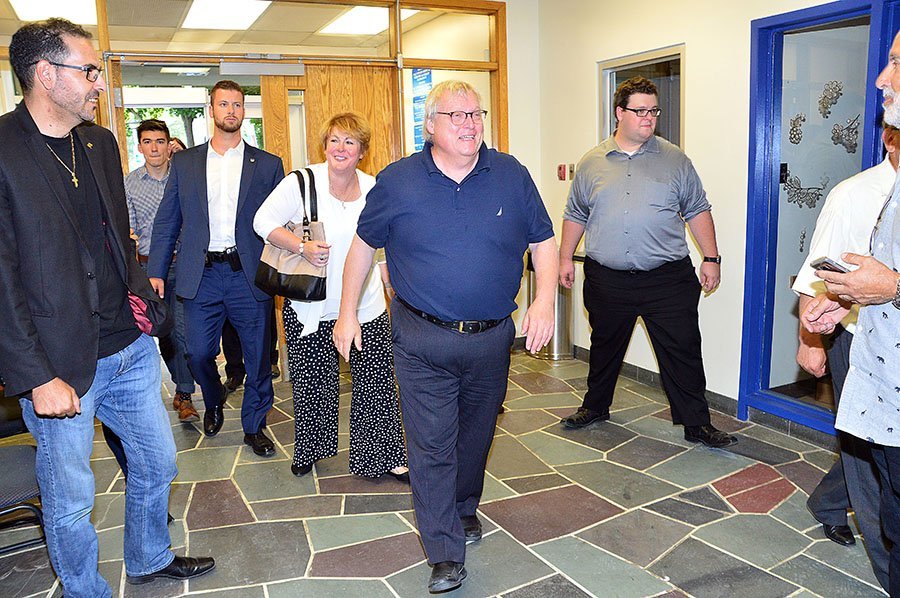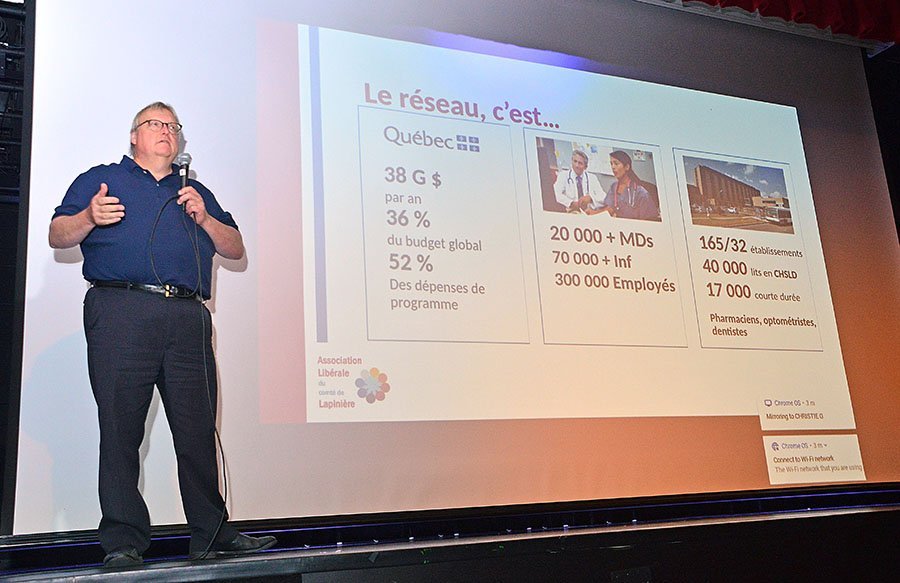
Martin C. Barry
After coming to Laval on Aug. 2 to explain the Quebec Liberal government’s controversial health and social service reforms of the past four years, Health Minister Gaétan Barrette found himself before an audience consisting mostly of labour union activists critical of the government’s management.
Large union presence
The gathering, organized by the Quebec Liberal Party’s political issues commission for the Laval region, took place in the auditorium of Laval Junior Academy on Daniel Johnson Blvd.
While attendance at the meeting was sparse, most of the questions following Barrette’s presentation were overwhelmingly from the unionists who made up at least two-thirds of the audience. They managed to maintain an acceptable level of decorum most of the time, despite occasional outbursts of sarcasm and laughter.
Arriving late, Barrette was greeted outside by very noisy union members from the Canadian Union of Public Employees as well as the Centrale des syndicats du Québec.

Barrette’s approach
As Barrette pointed out, he had been making the rounds in various areas of Quebec since June 15 making his presentation to audiences, which were considerably larger than the one that turned out in Laval.
“I do politics the way it should be: transparently, precisely, with a clear message and you can decide eventually,” he said.
Shortly after winning the last provincial election in 2014, the Liberals initiated an austerity program that saw some of the deepest cuts and policy changes in recent history made within various government departments – including the ministry of health.
Although the Liberals brought the austerity period to a close last year, there’s not much doubt Barrette held the toughest portfolio, tightly managing Quebec’s now $38.6 billion annual health and social services budget, representing 52 per cent of most provincial government spending.

Denies lowering budgets
“It’s been four years you’ve been hearing about austerity,” said Barrette, insisting that “austerity is when year after year we make the budget smaller.” All the same, he maintained that over a 15-year time span when the Liberals were in power, “there’s not once when we lowered the budget.”
However, he acknowledged, “We controlled the growth of expenses. That’s true.” Barrette also maintained that the Liberals consistently invested in the public health care sector, with a steady increase in services over 15 years.
A particularly ominous point Barrette wished to make was that if Quebec’s health care budget continues growing at its current rate, in 10 years, “if we don’t control expenses in health, or if we don’t reflect on the choices we have to make, the health budget will reach 65 per cent of the global budget,” he said.
Ballooning health budget
He pointed out that in 1972, a few years after the Quebec Health Insurance Plan’s creation by the government, public health and social services accounted for just 27 per cent of the overall provincial budget. “I say this in order to have you realize that if decisions are not made, we are going to have problems.”
By the time of the question period, Marc Ranger, Quebec director of the CUPE, was first to fire shots at Barrette. A veteran worker from the health and social services sector, Ranger accused the health minister of portraying himself as the “savior” of Quebec’s system of health care.
“Are you aware as minister of health, beyond those who defend the status quo, that there is a general demobilization never seen before in the health sector, that there are senior managers who quit and take retirement long before it’s time because they feel they no longer have a say,” said Ranger, who was loudly cheered by his colleagues.

No ‘demobilization,’ he said
Responding, Barrette said, “I myself don’t see that everywhere in Quebec there is a demobilization. I do see that there are difficulties. But I also see a bunch of regions where things are going well, where the shift is being made and is taking place in a spirit of collaboration.”
When Ranger asked again whether the health minister was “aware that a historic demobilization of human resources in the network,” Barrette replied, “I am perfectly aware that the reform I am undertaking is causing reactions. And I am perfectly aware of the fact that the shift is now taking place and it is not black as you are portraying it.”
Later during question period, Barrette and the meeting’s organizers were derided because five out of six of Laval’s Liberal MNAs failed to attend. Fabre MNA Monique Sauvé was the only local Liberal present. Asked for his views on Public Private Projects (PPP), Barrette said there wouldn’t be any as long as he was health minister. “A hospital is not a bridge,” he said.



